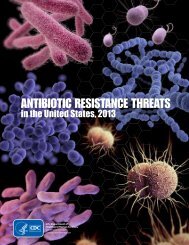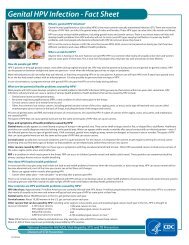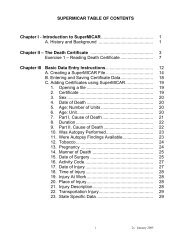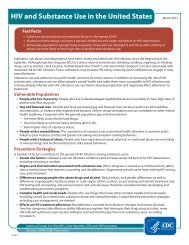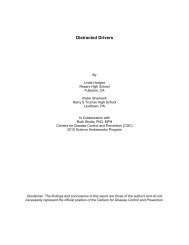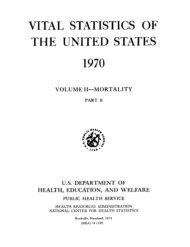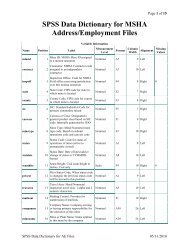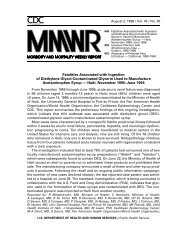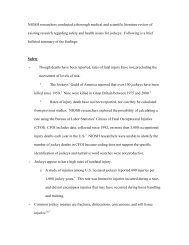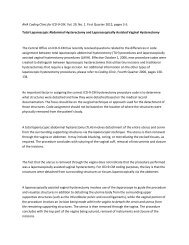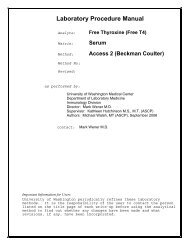Cathy A. Hansell, CCSR, MS, JD Dr. Christine Branche Pete Stafford
Cathy A. Hansell, CCSR, MS, JD Dr. Christine Branche Pete Stafford
Cathy A. Hansell, CCSR, MS, JD Dr. Christine Branche Pete Stafford
Create successful ePaper yourself
Turn your PDF publications into a flip-book with our unique Google optimized e-Paper software.
TM<br />
Your Host:<br />
<strong>Cathy</strong> A. <strong>Hansell</strong>, <strong>CCSR</strong>, <strong>MS</strong>, <strong>JD</strong><br />
President of Breakthrough Results, LLC<br />
Host & Executive Producer of Safety Breakthrough Talk Radio<br />
With Special Guest Speakers:<br />
<strong>Dr</strong>. <strong>Christine</strong> <strong>Branche</strong><br />
Principal Associate Director of NIOSH &<br />
Director of Office Construction Safety & Health with NIOSH<br />
And<br />
<strong>Pete</strong> <strong>Stafford</strong><br />
Director of CPWR, Center for Construction Research & Training<br />
Copyright © 2012, <strong>Cathy</strong> <strong>Hansell</strong>, Safety Breakthrough Talk Radio - All Rights Reserved<br />
Transcribed by Designing Words LLC
NIOSH FALL PREVENTION PROGRAM-<br />
<strong>Cathy</strong> <strong>Hansell</strong> interviews <strong>Dr</strong>. <strong>Christine</strong> <strong>Branche</strong> & <strong>Pete</strong> <strong>Stafford</strong><br />
INTRO:<br />
<strong>Cathy</strong><br />
Welcome to Safety Breakthrough Talk Radio. Do you have questions or worries<br />
about the safety, health or wellness of yourself, your family, friends or work<br />
colleagues? The answers are here. In the next thirty minutes you’ll learn about a<br />
safety, health or wellness topic, and how to make safer and healthier choices for<br />
yourself and for others. And now here is your host, <strong>Cathy</strong> <strong>Hansell</strong>.<br />
Welcome to Safety Breakthrough Talk Radio aired on the Amazing Women of<br />
Power Network, on iTunes News and Talk Radio. I’m your host <strong>Cathy</strong> <strong>Hansell</strong>. Today<br />
we’ve got a very special show. It’s a topic that affects all of us, whether at the work-<br />
place or at home and that is falls. Did you know that in the workplace, falls account<br />
for one-third of the on-the-job injuries? And in the construction industry particularly<br />
is the top cause of construction fatalities, 10,000 injuries and 200 people killed. It<br />
affects all of us and at home. So, those numbers could be even higher. Who knows<br />
how many people are injured by falls all the time.<br />
Well, here’s the good news! We can do something about this and today we’re going<br />
to be learning about a brand new program, The Fall Prevention Program. It was put<br />
together from a partnership of NIOSH, The National Institute of Occupational Safety<br />
and Health and the CPWR, The Center for Construction Research and Training.<br />
We have two very expert guests with us to tell us about this new program. In fact it<br />
is <strong>Dr</strong>. <strong>Christine</strong> <strong>Branche</strong>, the Principal Associate Director of NIOSH and the Director<br />
of Office Construction Safety and Health with NIOSH and <strong>Pete</strong> <strong>Stafford</strong>, the<br />
Executive Director of the CPWR, the Center for Construction Research and Training.<br />
So we cannot have better people here today to tell us about this brand new<br />
program, and to help us figure out how we are going to prevent these falls from<br />
occurring. So <strong>Christine</strong> and <strong>Pete</strong>, welcome!<br />
<strong>Christine</strong> Oh, it’s a pleasure to be with you today! Thank you!<br />
<strong>Pete</strong><br />
<strong>Cathy</strong><br />
Yes, thank you very much!<br />
Well, there’s a lot to talk about falls and this program. Can’t wait to get started! So<br />
let’s just jump in and talk about this fall prevention campaign, and where and how<br />
did it get started. So, <strong>Christine</strong> maybe you can start us off with that.<br />
<strong>Christine</strong> Oh I’m happy to do so! This whole idea of this as a campaign is apparently<br />
something that was brewing amongst stakeholders in the construction sector in this<br />
country for many years. And it really was born out of a partnership. So what is that<br />
partnership?<br />
www.breakthroughresults.org<br />
Copyright © 2012, <strong>Cathy</strong> <strong>Hansell</strong>, Safety Breakthrough Talk Radio - All Rights Reserved Page | 2
NIOSH FALL PREVENTION PROGRAM-<br />
<strong>Cathy</strong> <strong>Hansell</strong> interviews <strong>Dr</strong>. <strong>Christine</strong> <strong>Branche</strong> & <strong>Pete</strong> <strong>Stafford</strong><br />
The National Institute for Occupational and Safety and Health, as you said, NIOSH,<br />
has been presiding over something called the National Occupational Research<br />
Agenda, which we fondly refer to as NORA for many years now. In fact, we’re in our<br />
second decade. It’s really meant not for what stakeholders should tell NIOSH what<br />
to do, it’s not for NIOSH to tell what other people should be doing.<br />
But it really is meant for stakeholders and NIOSH and others to work together to<br />
determine what are the research issues for various topics in occupational safety and<br />
health. And for construction, in 2008, actually we sat down as a group of<br />
stakeholders and thought through what things needed to happen to move research<br />
ideas along in construction safety and health. And one of those ideas was given the<br />
very large problem of falls on construction sites, now the stakeholders really believe<br />
that it was important to put together a campaign for the trades and to really get the<br />
word out as well as to look to see if such a campaign could work towards behavior<br />
change.<br />
<strong>Cathy</strong><br />
Terrific! Now with that as background, can you share with us its overall purpose and<br />
its overall strategy in achieving that purpose?<br />
<strong>Christine</strong> Well the campaign really is meant to make people aware of the problem of falls in<br />
construction. And the focus is falls on roofs, falls from ladders, and falls from<br />
scaffolding. And rather than taking an approach that says this is what the workers<br />
should do, the real aim is to get information to contractors and site managers<br />
because they’re the ones that have to provide the equipment, to train the workers<br />
on what to do, and then to make certain that the workers actually use the fall<br />
protection apparatus and so forth. And then the workers have a responsibility to<br />
wear it. But the onus of responsibility first is on the contractors and the site<br />
supervisors. <strong>Pete</strong>, would you agree?<br />
<strong>Pete</strong><br />
I think that’s right. I think that if we look at first in the United States that the<br />
employers are responsible for safety and health of their employees so a campaign<br />
that would actually reach out and try to provide educational materials about the<br />
hazards of falls and let the industry know, employers particularly, those small<br />
employers in the residential sector, that there’s a lot of information that’s available<br />
to them that could help them in their programs to reduce hazards of falls in<br />
construction.<br />
www.breakthroughresults.org<br />
Copyright © 2012, <strong>Cathy</strong> <strong>Hansell</strong>, Safety Breakthrough Talk Radio - All Rights Reserved Page | 3
NIOSH FALL PREVENTION PROGRAM-<br />
<strong>Cathy</strong> <strong>Hansell</strong> interviews <strong>Dr</strong>. <strong>Christine</strong> <strong>Branche</strong> & <strong>Pete</strong> <strong>Stafford</strong><br />
As we look at the data over the years and see CPWR, as the NIOSH-funded National<br />
Construction Center has been doing research in the construction sector since 1990,<br />
we know that if you look at the fatalities in our industry, whether it is 1,200 fatalities<br />
a year or 1000 or 800, like it is in the past year, that consistently one-third of all the<br />
fatalities are due to falls. And there’s a lot that we know how to prevent these and<br />
that’s the important things. These are preventable things.<br />
So the campaign is all about building partnerships and reaching out in the hopes of<br />
getting employers and also workers to understand that there’s a lot of controls out<br />
there that can help them with their programs and hopefully reduce the number of<br />
falls throughout the industry.<br />
<strong>Cathy</strong><br />
Very good.<br />
<strong>Christine</strong> <strong>Cathy</strong>, there’s something that <strong>Pete</strong> said that actually if could embellish, would that<br />
be ok?<br />
<strong>Cathy</strong><br />
Oh, of course!<br />
<strong>Christine</strong> And that is the campaign is directed at small or residential construction site issues.<br />
It’s not to say there isn’t a message for all construction sites, but in building the<br />
scientific underpinnings for the campaign, we really were focused on small and<br />
medium sized residential construction facilities. The reason why is in many cases,<br />
the very large construction sites, it’s not say that they don’t have issues, but many of<br />
them do provide the fall protection and the training that we’d like to see replicated<br />
throughout the industry.<br />
<strong>Cathy</strong><br />
That’s a very, very good point. Actually one that’s pretty close to me. My brother is<br />
in construction. His expertise happens to be electrical safety and electrical work. But<br />
he has been in construction for a long time and he works for a small firm. And of<br />
course, his sister being in safety, I’m asking him the safety questions all the time,<br />
right?<br />
<strong>Christine</strong> Right! (Laughing)<br />
www.breakthroughresults.org<br />
Copyright © 2012, <strong>Cathy</strong> <strong>Hansell</strong>, Safety Breakthrough Talk Radio - All Rights Reserved Page | 4
NIOSH FALL PREVENTION PROGRAM-<br />
<strong>Cathy</strong> <strong>Hansell</strong> interviews <strong>Dr</strong>. <strong>Christine</strong> <strong>Branche</strong> & <strong>Pete</strong> <strong>Stafford</strong><br />
<strong>Cathy</strong><br />
Right! (Laughing) He tells me he has seen guys who don’t use all the needed fall<br />
protection gear. It’s to your point exactly that either the employer, whoever he’s<br />
working with or for at the time, they may not know the risks, or if they do know the<br />
risks, they may not have all the equipment, or if they do have the equipment, they<br />
may not know how to properly instruct their employees on how to don it or where<br />
do you place an anchor point when it doesn’t seem to be obvious? Or how do you<br />
put this harness on, or how do you work with a lanyard so that it is not in your way,<br />
when you still have the job that you need to do.<br />
There’s such a need for clarity in practices. You also answered the question, by<br />
providing some additional comments to add what <strong>Pete</strong> had said, that I wondered if<br />
this program was also for all contractors at all construction sites. Not just in<br />
construction safety, but also in reviewing the materials I would think it would be a<br />
great value to all work places. Not just construction workplaces in construction<br />
activities but all industry.<br />
So, is your intent to also try to communicate this<br />
information to others, so that they can take advantage of what you’re presenting<br />
here?<br />
<strong>Pete</strong><br />
I’ll take a shot at that <strong>Christine</strong>. I think certainly that we would like to see it grow.<br />
And I think that you’re correct that there’s a lot of things that we do in construction<br />
just like there’s things that are done in other industries, like mining or agriculture,<br />
that are applicable. So I think that our point is the focus now is to try to reach<br />
construction employers.<br />
But you’re right to the extent that this information could be useful and as we hope<br />
that we’re successful in bringing in different partners, who have reaches through<br />
other industries, that it would be useful. I think that while it’s not really our grand<br />
vision at the beginning, there’s certainly some things that we are doing as a part of<br />
this campaign that I think that would be applicable to other industries.<br />
<strong>Christine</strong> Absolutely! And if I could add to what <strong>Pete</strong> said, the idea that there may be some<br />
information that’s relevant to even a consumer-based audience, I think it’s<br />
appropriate. If your listener’s take a look at the campaign materials, I think they’ll<br />
find the messages are very clear, that we’ve tried to use as much as possible,<br />
illustrations, so that even low literacy audiences can access the information well.<br />
And we have the information, campaign materials both in English and in Spanish.<br />
www.breakthroughresults.org<br />
Copyright © 2012, <strong>Cathy</strong> <strong>Hansell</strong>, Safety Breakthrough Talk Radio - All Rights Reserved Page | 5
NIOSH FALL PREVENTION PROGRAM-<br />
<strong>Cathy</strong> <strong>Hansell</strong> interviews <strong>Dr</strong>. <strong>Christine</strong> <strong>Branche</strong> & <strong>Pete</strong> <strong>Stafford</strong><br />
<strong>Cathy</strong><br />
Very good. I was just about to ask you that, because it seems that such a large<br />
percentage of our workforce is Spanish speaking. So that’s very good to have the<br />
materials also in Spanish so we’re reaching as many people as we can.<br />
<strong>Pete</strong><br />
<strong>Cathy</strong><br />
Right. And particularly that’s the case in the residential sector, which is the primary<br />
target here. But to get back to your question to what <strong>Christine</strong> laid out--- the initial<br />
plans for the campaign, and that we’re targeting these three areas that we can see<br />
by the data, are the areas or the hazards that are accounting for a lot of the<br />
fatalities, and within the construction sector. I mean there’s other fall hazards and<br />
even though the target is ladders and scaffolds and roofs, we’d hope that it would<br />
be expanded to contractors that do heavy highway work and members who are<br />
working on bridges or large industrial projects. In the end, we hope that this<br />
program is expanded for all construction, even though we have a targeted place<br />
where we’re starting in the residential sector.<br />
Very good. Well let’s get into all the materials that are available. Can you describe<br />
the tools and resources and other types of communication that you might have to<br />
help the contractors and the site managers, and I assume that their safety<br />
professionals that work with them and that a lot of these resources are going to be<br />
used by. So, can you describe those materials for us?<br />
<strong>Christine</strong> <strong>Pete</strong>, you want to take a first shot at that?<br />
<strong>Pete</strong><br />
Yeah, sure! I think it’s important to point out for this campaign and what is I think is<br />
a tremendous success for <strong>Christine</strong> and the other folks on the NORA Sector Council<br />
and we were successful in bringing OSHA along as a key partner because they have<br />
such reach in the industry and employers pay close attention to OSHA. We had an<br />
example, where we did research on nail guns and NIOSH and OSHA, just for as an<br />
example, produced this great guidance document on nail guns and OSHA put it up<br />
on their website. In just a matter of months, they have over a half-a-million hits<br />
accessing that document.<br />
Bringing OSHA along with this campaign was tremendously beneficial in terms of<br />
getting the word out. So with OSHA as a partner and CPWR, we really have three<br />
websites, OSHA has a website, NIOSH has a website, and CPWR has a website. And I<br />
can speak specifically about our website where it’s really our aim is to provide useful<br />
information to employers and workers.<br />
www.breakthroughresults.org<br />
Copyright © 2012, <strong>Cathy</strong> <strong>Hansell</strong>, Safety Breakthrough Talk Radio - All Rights Reserved Page | 6
NIOSH FALL PREVENTION PROGRAM-<br />
<strong>Cathy</strong> <strong>Hansell</strong> interviews <strong>Dr</strong>. <strong>Christine</strong> <strong>Branche</strong> & <strong>Pete</strong> <strong>Stafford</strong><br />
So, for example, on the website we have two Tool Box Talks dealing with safety<br />
hazards in all three areas: on portable ladders, scaffolds, and roof tops. We have<br />
training guides for how you work around guard rails as an example. We have training<br />
guides for supervisors, manuals about protecting workers; we have videos, a Don’t<br />
Fall for It video that CPWR produced as part of our construction center research<br />
program that’s been available.<br />
And we’re collecting information; we’re not trying to reinvent the wheel here!<br />
Because there’s lots of organizations in the United States, Canada and other places<br />
that have developed excellent training tools and guides around fall protection in<br />
construction. So our website has really not just what CPWR or NIOSH has developed,<br />
but we’re trying to pull together all the useful information we know about. There<br />
are materials out there that are useful for both employers and for workers.<br />
<strong>Christine</strong> And if I can speak to some other things. <strong>Pete</strong> is absolutely right about what it is that<br />
CPWR is doing to support the campaign. But what has been wonderful about this<br />
partnership and being able to have an entity like CPWR involved is that they can put<br />
on their website information that’s useful for the industry, but really is not<br />
appropriate for a host of legal reasons for government websites.<br />
So we’ve asked, and <strong>Pete</strong> has agreed, to be the one website that is most supportive<br />
of the campaign. Now for OSHA, OSHA actually printed, prepared and printed all of<br />
the campaign materials that are that can be ordered and things like campaign<br />
posters and the fact sheet, in English and in Spanish. And so that’s the information<br />
that can be obtained from the OSHA website, along with other of their regulatory or<br />
enforcement information that they thought was appropriate to include. So that<br />
information is available at their website. And that web address for them is<br />
www.osha.gov/stopfalls.<br />
As far as the NIOSH website, we have information that provides the scientific<br />
information that we like to make available to researchers and others who are<br />
interested in the research information that supports any activity or any topic and so<br />
that can be found from our website, and that’s<br />
www.cdc.gov/niosh/construction/stopfalls.<br />
Actually, if I can <strong>Cathy</strong>, I’d like to speak to one other thing and that is why would<br />
NIOSH be involved in this program, given that’s it’s a campaign that gets information<br />
out broadly. NIOSH is a statutory partner of OSHA. That’s actually true from a<br />
congressional act that created both of our entities. And so we do the research and<br />
www.breakthroughresults.org<br />
Copyright © 2012, <strong>Cathy</strong> <strong>Hansell</strong>, Safety Breakthrough Talk Radio - All Rights Reserved Page | 7
NIOSH FALL PREVENTION PROGRAM-<br />
<strong>Cathy</strong> <strong>Hansell</strong> interviews <strong>Dr</strong>. <strong>Christine</strong> <strong>Branche</strong> & <strong>Pete</strong> <strong>Stafford</strong><br />
OSHA does the regulatory and enforcement role. And even though NIOSH presides<br />
over NORA, which I explained to your listeners earlier, for this campaign, our role<br />
really was pulling together the partners who actively engaged in going through<br />
reams and reams of information to try to sort out these issues I think that <strong>Pete</strong><br />
articulated very well as to why falls on construction sites make sense to focus on.<br />
We looked through a host of campaigns, not only in the United States but also<br />
internationally to see if there were campaigns that already existed that could simply<br />
could be replicated. And then we provided the scientific underpinnings for how this<br />
particular campaign should be designed, so that we knew based on the research that<br />
a low literacy approach was appropriate. The graphical designs, they’re not perfect,<br />
but they’re very good based on the information and the research that we pulled<br />
together. And CPWR, given their role as the NIOSH funded National Construction<br />
Center, played a key role in being able to pursue the research specifically for how<br />
this campaign should be designed. And so we really did a lot in partnership not just<br />
with CPWR, but with OSHA. And I mention that because this idea of partnership is so<br />
key in why this campaign has been able to be pulled off in the first place and<br />
successful based on everything we’ve seen so far.<br />
People in trade associations, labor organizations, professional organizations, and<br />
researchers, as well as State and Federal Government entities are the people, who<br />
make or the organizations that make up the National Occupational Research Agenda<br />
Construction Sector Council. So our NORA Construction Sector Council is made up of<br />
people who are absolutely in the right place in the industry, they know what’s going<br />
on and they really have done quite a bit to make this campaign a success.<br />
<strong>Pete</strong><br />
Yes. Let me just add <strong>Christine</strong> I think that was a very good description. I think I<br />
consider this sector council like the core group of this campaign, and in the end it’s,<br />
we hope can build networks around that core because in this industry, like a lot of<br />
others, it’s all about relationships. So we have folks that are on the sector council<br />
and their lives are that they represent an employer organization or a research or a<br />
labor union obviously has connections back to other organizations and I think the<br />
whole idea of developing partnerships is the key to this.<br />
I mean we talked earlier you know about looking at the demographics of the<br />
industry and we know that 90 percent of the United States construction employers<br />
have 20 employees or less. We know based on the data that over 2-million<br />
construction workers are classified as self-employed or independent contractors. So<br />
www.breakthroughresults.org<br />
Copyright © 2012, <strong>Cathy</strong> <strong>Hansell</strong>, Safety Breakthrough Talk Radio - All Rights Reserved Page | 8
NIOSH FALL PREVENTION PROGRAM-<br />
<strong>Cathy</strong> <strong>Hansell</strong> interviews <strong>Dr</strong>. <strong>Christine</strong> <strong>Branche</strong> & <strong>Pete</strong> <strong>Stafford</strong><br />
they don’t have large associations to that they work with and this is what makes our<br />
industry so difficult to get at, it’s the transient nature of both the jobs and the<br />
workforce. To the extent that we can really drill down and get information to the<br />
self-employed and the small employers in rural areas is really the key.<br />
And I don’t see how we can do that unless we continue to build on traditional<br />
partnerships and other partnerships where we hope to get our reach like community<br />
groups, religious organizations. Those kinds of things, any and all people that have<br />
some kind of access to the population that we’re trying to reach is really in my view<br />
the continued development of the partnerships is going to be key to this.<br />
<strong>Cathy</strong><br />
That’s excellent. Obviously a very, very well thought out, well executed program<br />
from the partnerships that you’ve described, maximizing every opportunity for<br />
success coming in this from all different avenues, NIOSH, NORA, and the NORA<br />
Construction Sector Council, the CPWR, OSHA, the other trade associations that you<br />
mentioned. So it’s extremely well thought out, well planned, and well executed to<br />
get this campaign launched which was very recent, right? On April 26 I think?<br />
<strong>Christine</strong> Yes, that’s correct. It was meant to be in sync with Workers Memorial Day, which<br />
fell on a Saturday this year. And we were fortunate that certainly with having OSHA’s<br />
key involvement, and they were wise to be able to include the Department of Labor,<br />
Secretary Hilda Solis as the one to actually launch the campaign along with other<br />
Worker Memorial Day activities that the Department of Labor had in store. So on<br />
Thursday, April 26 the campaign was officially launched.<br />
<strong>Cathy</strong><br />
Now it’s very recent, but I’m just wondering if you’ve had any feedback already<br />
about successes of the program, about the reach of the program, the development,<br />
the tools that are available that <strong>Pete</strong> described; have you gotten any responses yet?<br />
<strong>Christine</strong> <strong>Pete</strong>, I’ll let you take the first crack at it, I’ll supplement.<br />
<strong>Pete</strong><br />
Well, I guess the short answer is yes. I mean on our website only in the first 16 days<br />
after the launch of the campaign we’ve had about 14,000 visitors to CPWR website.<br />
And a lot of those folks just want to learn more about the campaign and of course<br />
our website describes that and what you can do to become a partner in that kind of<br />
thing. So we’ve had several many organizations that have contacted CPWR inquiring<br />
about how they can get involved through the NORA sector council. We’ve developed<br />
criteria style guides and that kind of thing that would help us go through and vet<br />
what comments we’re getting and how we can appropriately respond.<br />
www.breakthroughresults.org<br />
Copyright © 2012, <strong>Cathy</strong> <strong>Hansell</strong>, Safety Breakthrough Talk Radio - All Rights Reserved Page | 9
NIOSH FALL PREVENTION PROGRAM-<br />
<strong>Cathy</strong> <strong>Hansell</strong> interviews <strong>Dr</strong>. <strong>Christine</strong> <strong>Branche</strong> & <strong>Pete</strong> <strong>Stafford</strong><br />
And what people can do to be partners. I think that the partnership again, as you<br />
could take the campaign poster and if you meet the criteria of the study guide and<br />
going through this vetting process, we’re encouraging people to take that poster and<br />
put their own logo’s on it and do what they will with it and far as dissemination. So<br />
we’ve gotten a lot of interest in that.<br />
You know, I think a large campaign like this in terms of going back and looking at it<br />
from really an evaluation standpoint we are the developing an evaluation<br />
component to this program. Of course it’s a little bit too early, but we do plan on<br />
evaluating this thing, so after a year of the campaign and hopefully as we go into<br />
year two, that we will be able to modify as we go based on a more scientific<br />
evaluation of our reach.<br />
<strong>Cathy</strong><br />
Very good.<br />
<strong>Christine</strong> And actually <strong>Pete</strong> spoke to something and that is that we do envision at least a twoyear<br />
arch. To the campaign and we are even now laying out our plans for the<br />
information that we want to add to the campaign website over time. You can<br />
imagine that sometimes we’ll focus on ladders, sometimes on scaffolds, and<br />
sometimes on falls from roofs. And we will add information and Tool Box Talks as<br />
<strong>Pete</strong> has already described and other relevant material over that two-year window<br />
of time.<br />
<strong>Cathy</strong><br />
<strong>Pete</strong><br />
Thank you for that comment. Something that I was wondering about, is actually<br />
triggered from things that both of you have said. There’s a signup opportunity I<br />
believe and inquiry opportunity on the websites, as well as seeking information how<br />
to become a partner. Now <strong>Pete</strong> that’s some of the things that you had mentioned.<br />
Within those opportunities to communicate via the website, are there also<br />
opportunities for providing comments to either NIOSH or to CPWR for<br />
enhancements or additional tools or questions, so that it’s actually accelerating what<br />
you might offer as your program evolves over the two-year period.<br />
Yes for at least CPWR. I’ll take that <strong>Christine</strong>. The answer to that is yes. I mean one<br />
of the things that I think is unique to our website is we’ve built into the website a<br />
fatalities map. Our website went live on April 26 when Secretary Solis made the<br />
announcement as <strong>Christine</strong> referred to earlier. As a part of this website to make it<br />
interactive, we’ve imbedded a construction fatalities map. And that map is intended<br />
to show in real time, construction fatalities in the United States geographically<br />
across the country, that can drill down to the street address.<br />
www.breakthroughresults.org<br />
Copyright © 2012, <strong>Cathy</strong> <strong>Hansell</strong>, Safety Breakthrough Talk Radio - All Rights Reserved Page | 10
NIOSH FALL PREVENTION PROGRAM-<br />
<strong>Cathy</strong> <strong>Hansell</strong> interviews <strong>Dr</strong>. <strong>Christine</strong> <strong>Branche</strong> & <strong>Pete</strong> <strong>Stafford</strong><br />
There are two goals really. One as a pilot to see if we can do it in terms of actually<br />
capturing construction fatalities in real time because we rely on BLS and other<br />
National data that there’s a year to two time lag by the time that the data is final.<br />
And we had thought that as a part of this process to actually learn about<br />
construction fatalities and this map will break fatalities out by falls, or by other<br />
hazards.<br />
It was also a way to get people interested and also exchange information so that we<br />
can collect information or provide what we know based on available public data<br />
sources about fatalities. And the data is primarily derived from information that we<br />
get from OSHA and we do Google searches, just trying to search around the country<br />
where you, for example, go and can find a short blurb in a local newspaper about a<br />
fatality in that area. But really this is the whole idea. The map is to be an interactive<br />
way in which we can exchange information about fatalities and in particularly about<br />
falls fatalities and construction. I would encourage your listeners to go to the<br />
website and check it out. It’s very interesting and very informative.<br />
<strong>Cathy</strong><br />
<strong>Pete</strong><br />
Well <strong>Pete</strong>, can you give us the websites that you would like us to go to so that we<br />
can get more information and we can find out about the Tool Box Talks that you<br />
mentioned and training guides. Where would we find those?<br />
That would be on our website <strong>Cathy</strong>, and that’s www.stopconstructionfalls.com.<br />
<strong>Christine</strong> If I could add one thing, there’s also <strong>Cathy</strong>, if I recall your question, about people’s<br />
ability to provide feedback or other things, there is also an email address for people<br />
to either specific inquiries or to offer comments. Isn’t that right <strong>Pete</strong>?<br />
<strong>Pete</strong><br />
<strong>Cathy</strong><br />
Yes. So that the email address where you could exchange information is at<br />
cpwr.com.<br />
Ok. Well thank you for that <strong>Pete</strong>! Well, our time is running out and I’d like to give<br />
both of you a chance to highlight from your own perspective, what do you think is<br />
the key message and remember, we’ve got safety professionals listening here, we’ve<br />
got business leaders, and we’ve got folks who may be at home and are listening to<br />
how do I prevent falls in my own home. So what are some key takeaway messages<br />
that you’d like to offer our listeners and once again, I will ask you to please say email<br />
addresses, the websites, any phone numbers, and any contact information that<br />
you’d like to give people. So <strong>Pete</strong>, why don’t you begin. What’s your key takeaway<br />
message for us and how do we reach you, one more time?<br />
www.breakthroughresults.org<br />
Copyright © 2012, <strong>Cathy</strong> <strong>Hansell</strong>, Safety Breakthrough Talk Radio - All Rights Reserved Page | 11
NIOSH FALL PREVENTION PROGRAM-<br />
<strong>Cathy</strong> <strong>Hansell</strong> interviews <strong>Dr</strong>. <strong>Christine</strong> <strong>Branche</strong> & <strong>Pete</strong> <strong>Stafford</strong><br />
<strong>Pete</strong><br />
Well you can reach us at our website, our email address is falls@cpwr.com and our<br />
campaign website is www.stopconstructionfalls.com. I guess in terms of takeaway<br />
messages I think that it’s important to us in the industry that are involved in<br />
construction safety and health that this is clearly an area where we see that we can<br />
have a huge impact if we can do something about fatalities due to falls in our<br />
country. I think that all of would agree, we know how to do that so it’s not that we<br />
don’t know what the hazards are and what you can do to protect yourself from<br />
these hazards.<br />
What we really are focusing on is how we get this information out to the industry.<br />
So to the extent that your listeners are obviously interested (if they’re listening they<br />
are interested in this topic), and can help us or provide to us their feedback or pass<br />
information along about the campaign. Just continue to spread the word is really<br />
what we’re looking for because it’s all about reaching out and getting the<br />
information that we know, not creating new things here. We know what to do, we<br />
just have to get the word out to the industry.<br />
<strong>Cathy</strong><br />
Excellent. Thank you. And <strong>Christine</strong>? What comments would you offer?<br />
<strong>Christine</strong> I really appreciated working with <strong>Pete</strong> and his team on this. They’re just great<br />
colleagues. And that’s been actually the experience throughout building this<br />
campaign. It’s been a wonderful display of partnership. The only other thing I would<br />
say is the messages of the campaign are simple, they’re clear, it really is a very good<br />
campaign and I hope that it will prompt your listeners whether they’re safety<br />
professionals or people who are actually involved in the industry as contractors, as<br />
site managers, or as workers themselves. And frankly even as owners of the<br />
properties that are being constructed, that these messages resonate with them as<br />
well.<br />
I know I’ve been, here I am working in tangentially in the construction industry and<br />
when my husband and I had our roof repaired earlier this spring, we selected a<br />
contractor because they were the only ones who talked about using fall protection<br />
for their workers. My husband and I realized that this was a key decision that we<br />
could make, that could reinforce the messages of the campaign. And I hope that<br />
your listeners will understand that and will do the same.<br />
<strong>Cathy</strong><br />
Excellent. Well thank you both so much. I think from my perspective, the campaign’s<br />
as you both have said, initial target is in the construction area, and in the residential<br />
sector of construction, and looking at the particular risks of falls from roofs, from<br />
www.breakthroughresults.org<br />
Copyright © 2012, <strong>Cathy</strong> <strong>Hansell</strong>, Safety Breakthrough Talk Radio - All Rights Reserved Page | 12
NIOSH FALL PREVENTION PROGRAM-<br />
<strong>Cathy</strong> <strong>Hansell</strong> interviews <strong>Dr</strong>. <strong>Christine</strong> <strong>Branche</strong> & <strong>Pete</strong> <strong>Stafford</strong><br />
ladders, and from scaffolding. And as both of you have said, there is the intent over<br />
the two-years and the recognition that this information can not only apply to the<br />
small site construction activities, but also the larger sites, as well as general work<br />
places and even <strong>Christine</strong> as you said, to personal situations. So, falls are falls.<br />
I think the good news is they really can be prevented with the right kind of<br />
information and the right kind of equipment provided and the motivation to use it.<br />
And the encouragement to use it. We can stop these injuries.<br />
So, I am so grateful for both of you for giving us your time today, and all of your<br />
insights. This wonderful program! And please, for those who are listening, to really<br />
consider going to the websites, looking at what’s there and looking and saying, how<br />
does this apply to me? And there’s even emails and communication mechanisms for<br />
<strong>Christine</strong> through NIOSH and <strong>Pete</strong> through the CPWR the Center for Construction<br />
Research and Training. They want you to have this information and any feedback<br />
and comments are so welcome.<br />
So, thank you both so much for your time. And I hope everyone’s very excited about<br />
this, as obviously you two are and I am too! Because this is a wonderful stride<br />
forward into getting probably one of the greatest hazards that we’ve got at our job<br />
sites right now.<br />
<strong>Pete</strong><br />
Well thank you very much <strong>Cathy</strong>. It was my pleasure. And I greatly appreciate your<br />
time.<br />
<strong>Christine</strong> Thank you for your interest in this. It’s been a wonderful opportunity. Thank you.<br />
<strong>Cathy</strong><br />
Closing<br />
Well you’re both certainly welcome. And for those who are listening, I hope you’ve<br />
enjoyed this. It is all about how we live safer and healthier lives. And a great deal of<br />
it is under our control. So this is has been Safety Breakthrough Talk Radio and I’m<br />
<strong>Cathy</strong> <strong>Hansell</strong>, your host and have a safe day. Good-bye.<br />
You’ve been listening to Safety Breakthrough Talk Radio. Hosted by <strong>Cathy</strong> <strong>Hansell</strong>.<br />
SBTR, dedicated to helping people live safer and healthier lives. Be sure to check out<br />
<strong>Cathy</strong>’s website, at www.breakthroughresults.org. You can reach <strong>Cathy</strong> by email at<br />
chansell@breakthroughresults.org or by phone at 888-609-6723 or 908-652-1366.<br />
Have a safe day!<br />
www.breakthroughresults.org<br />
Copyright © 2012, <strong>Cathy</strong> <strong>Hansell</strong>, Safety Breakthrough Talk Radio - All Rights Reserved Page | 13




